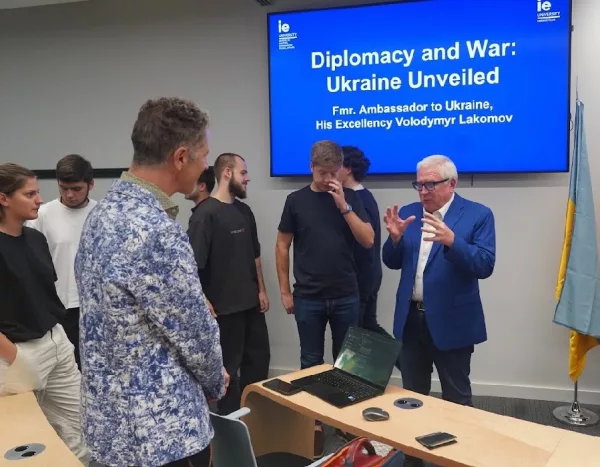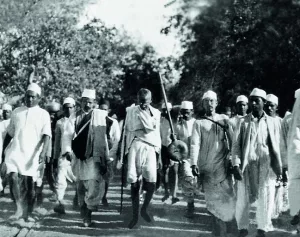On February 24th, 2022, Volodymyr and his wife Olga woke up at five in the morning to a soul-crushing sight: a missile ravaging the sky. This moment marked the dawn of a new era for Ukraine, which nevertheless carried a haunting and familiar sadness. Seemingly an era of perpetual loss, another cruel attempt at abduction orchestrated by Russia — not of mere territory, but of the very soul of Ukraine. This was yet another attempt to erase Ukrainian history and culture, to obliterate Ukrainian identity.
Volodymyr Lakomov, the honorable ex-ambassador of Ukraine visited IE University last month to offer valuable insights on the ongoing Russo-Ukrainian War discussing both historical and cultural aspects behind the cruel conflict.
Throughout the tumultuous years of Ukrainian independence, Lakomov has bravely defended Ukrainian interests abroad. Lakomov’s honorable service as the ambassador of Ukraine in Angola, Mozambique, Brazil, Guyana, Bolivia, Suriname, and, most recently, Pakistan proves his tireless dedication to defending Ukrainian sovereignty. He was awarded the Order of the Southern Cross (the highest Brazilian state award for foreigners) for his outstanding service in Brazil. After his official retirement as ambassador on August 14, 2023,, Lakomov continued to be the director of the MFA Departments, analyzing international security and sanctions policies. Lakomov’s experience and knowledge have proven to be an invaluable resource to become an important non-state advisor for the current Minister of Foreign Affairs of Ukraine, Dmytro Kuleba.
The memory of constant struggle for survival is ingrained in the Ukrainian collective consciousness. People under 40 most likely cannot fathom the emaciated bodies, devoid of life, and faces deprived of the hope of countless Ukrainians left to starve when Moscow dispatched armed squads to steal the remaining grain and livestock on Ukrainian soil during the Holodomor, but Ukraine remembers. The oldest generations remember the aftermath of the Second World War. Many choose to remain silent, for only then must they not admit the most painful truths: the mass deportations to the gulags by the NKVD during the Red Army’s retreats, the bombings of the Dnieperpetrovsk Dam, towns and factories torn down and their workers deported beyond the Urals, the merciless looting, rape and mass killings carried out by the SS and Gestapo, and the relentless partisan warfare. All this violence, all this blood, spilled over the Ukrainian fields and soaked in the eyes of those who bore witness to it.
Ukraine suffered beyond measure, more than it could bear; Ukrainian civilians perished in greater numbers than any other, and yet, not a single war memorial stands to honor Ukraine’s sacrifice. The world remembers Russia as the victor, while Ukraine remains an unwritten chapter in history books.

My grandmother wrote, “How many of my people were taken away to cemeteries during those first spring days, after a hungry and bitter winter? How many were only innocent children? And men who had returned from War were not spared from hunger. Each morning, my mother would inspect my father’s well-being with anguish, checking if he hadn’t swelled, fearing the onset of the unstoppable process. Meanwhile, we stared into our mother’s eyes, terrified of the unrelenting future.” No Ukrainian wants the return of the Soviet Union that took the lives of so many.
Volodymyr Lakomov is no exception. He has had personal relations with intriguing contemporary political personalities such as Hugo Chavez, ex-President of Venezuela, and Evo Morales, ex-President of Bolivia. He explained how, when having personal conversations with these political leaders, he attempted to convince them of the dire consequences communist ideals ensure for their countries. He hoped for them to see how their ‘socialist revolutions’ have turned their countries into authoritarian states, stripping them of their wealth but, more importantly, their people’s freedoms.
During his years in Pakistan, Volodymyr and Olga faced an enormous cultural clash but also discovered one essential truth about today’s politics:
Nations use politics to invoke fear and assert dominance through appearances devoid of substantive actions.
This statement highlights the reason why Lakomov insisted that the widespread fear that Russia might use nuclear weapons in Ukraine is greatly exaggerated and simply not credible. Had this been true, President Putin would have explicitly issued a nuclear threat to Ukraine. However, Putin’s messaging was geared towards instilling worry in the West so they would coerce Ukraine into negotiations and thereby freeze the battlefield. If Russia’s threats had been genuinely serious, the Ukrainian bombardment of the Kerch Bridge alone should have triggered retaliation.
Nevertheless, such retaliation remained absent. The fact that the West is still fearful of Russian nuclear threats underscores an important, unmissable fact. Lakomov put it best: “The West is only starting to understand Ukraine while misunderstanding what Russia is.”
The lack of understanding of the reality of Russian politics stems from the long history of the West disregarding Russian imperialist and colonial nature. Instead, they have glamorized and recognized Russian culture as more important when compared with the cultures of neighboring countries. This has resulted in the current Western belief that the suffering of Ukrainians can be equated to the inconveniences Russian civilians face due to international sanctions.
Lakomov explains that this neglect has further led the West to misjudge Ukraine’s potential gravely. Putin’s claims that Lenin created Ukraine is yet another notorious attempt to undermine Ukraine. In reality, Ukraine has a long history of national movement going back deep into Tsarist times. It is often forgotten that Ukraine declared independence in 1917 following the Tsar’s removal by the Bolsheviks’ revolution. The Bolshevik movement struggled to establish the Soviet Union’s rule in Ukraine until 1923, facing opposition from various groups, including Cossacks and Poles, all yearning to break away from Russia’s deadly grip.
Therefore, it is not shortsighted to recognize that Russia could never defeat Ukraine. Despite 300 years of prohibition and russification, Ukraine has always persisted because Ukraine is not just a place but a resilient community held together with great spirits, ancient history, and deep-rooted traditions of fighting for independence. This same fact is echoed by the relentless Ukrainian resistance, which, against all expectations, has endured well beyond the predicted by Russia’s three days of conflict. The resistance stands as testimony to the unbreakable spirit of the Ukrainian people.
Volodymyr also shared that the current War has been in the works since the birth of Ukrainian independence in 1991. The former president of Russia, Boris Yeltsin, recognized that without Ukraine, the dream of the rebirth of the Soviet Union would not be feasible. Under the guidance of Vladimir Surkov, First Deputy Chief of the Russian Presidential Administration, Putin embraced the policy of the Mongol Empire’s conquests – expanding territories through War. Lakomov further insisted that Ukrainians’ resilience also originates from refusing the return of the Soviet Union on Ukrainian soil ever again. The repression during the Soviet Union years has deeply marked every family in such a way that many still seek vengeance.
Lakomov also compares Ukraine’s fight for freedom with the biblical battle of David and Goliath. It is the seemingly weak Ukraine that emerges as the true game-changer, the nation that stands alone and prevails over the tyrant. From school graduates courageously performing their last dance in shelled-out schools to farmers who towed the Russian tanks with the dreadful Z signs and the thousands who joined the military without hesitation, all echoing Zelensky’s declaration, “I need ammunition, not a ride.” In the real world, David is not one but all of Ukraine. In the face of the Russian Goliath, every Ukrainian stands defiant. Russia will never succeed, for there is nothing on this Earth that can shatter the hope and faith in the victory of the Ukrainian people.

In conclusion, Voodymyr Lakomov shared valuable insights on the ongoing war in Ukraine that serve as hope for a future where the true narrative of Ukraine’s struggle will be rightfully, globally recognized. But one thing is certain, the Ukrainian people’s spirit is undefeatable, just like Lina Kostenko, a great Ukrainian poet, wrote, “And you thought that Ukraine is so simple. Ukraine is great. Ukraine is exclusive. All the rinks of history have passed through it. It has worked out all kinds of tests. It is hardened by the highest hardening. In today’s world, it has no price.”
Ukraine will forever continue to stand strong.
Personal Gratitude:
To conclude this discussion, I wish to thank Volodymyr Lakomov for sharing his knowledge with students during the event organized by the IE Ukrainian Club. Lakomov’s visit served to inspire the next generation of Ukrainian diplomats and provided insights into his political career and the ongoing Russo-Ukrainian War. It was impactful to hear him speak on serious matters, but also get to know him as a person first and then as a politician. Thank you to Olga, who helped create a warm and welcoming atmosphere at the conference. Finally, Thank you to everyone who helped bring this event together. Hopefully, there will be more similar events in the future to help dismantle the stigma and stereotypes about Ukraine and the Russo-Ukrainian War.
Featured image: IE Ukraine Club






